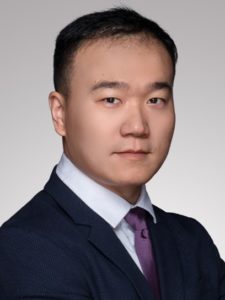 |
Junpeng Zhao received his B.S. (2005) and Ph.D. (2010) from University of Science and Technology of China under the supervision of Prof. Guangzhao Zhang. From 2007 to 2009, he undertook a joint Ph.D. appointment, supported by China Scholarship Council, in National Hellenic Research Foundation (Greece) under the supervision of Prof. Stergios Pispas. Afterwards, he was a postdoctoral researcher first at Max-Planck Institute of Colloids and Interfaces (Germany) with Prof. Helmut Schlaad and Prof. Markus Antonietti (2011-2012), and then at King Abdullah University of Science and Technology (Saudi Arabia) with Prof. Nikos Hadjichristidis (2012-2014). In early 2015, he joined South China University of Technology and began his professorship. His main research interest is synthetic polymer chemistry, with special focus on anionic polymerization, organocatalytic/metal-free polymerization, and synthesis of polymers from renewable resources. He has been the coauthor of 70 peer-reviewed papers and 15 patents, and the (co)supervisor of 25 master/Ph.D. students.
Read Junpeng Zhao’s Emerging Investigator’s article, ‘ Selective ring-opening polymerization of glycidyl esters: a versatile synthetic platform for glycerol-based (co)polyethers’ |
Read our interview with Junpeng below.
1. How do you feel about Polymer Chemistry as a place to publish research on this topic?
Submitting my work to Polymer Chemistry ensures a pleasant reviewing process as well as timely publication.
2. What aspect of your work are you most excited about at the moment and what do you find most challenging about your research?
What I am most excited about at the moment is the strict but readily tunable chemoselectivity of two-component organocatalysts which enables precise and convenient synthesis of an increasingly large variety of functional and/or complex polymers. What I have found most challenging is understanding polymerization mechanism, without disproving it soon after.
3. In your opinion, what are the most important questions to be asked/answered in this field of research?
How can we avoid major side effects when trying to make the world a better place using synthetic polymers? What can we learn from nature about designing and tailoring polymer structures and functions?
4. Can you share one piece of career-related advice or wisdom with other early career scientists?
New successes may hide in experiments which seem to have failed at first glance.










